Related Research Articles
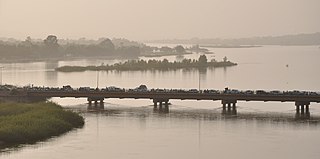
The Niger River is the main river of West Africa, extending about 4,180 km (2,600 mi). Its drainage basin is 2,117,700 km2 (817,600 sq mi) in area. Its source is in the Guinea Highlands in south-eastern Guinea near the Sierra Leone border. It runs in a crescent shape through Mali, Niger, on the border with Benin and then through Nigeria, discharging through a massive delta, known as the Niger Delta, into the Gulf of Guinea in the Atlantic Ocean. The Niger is the third-longest river in Africa, exceeded by the Nile and the Congo River. Its main tributary is the Benue River.

Kogi State is a state in the North Central region of Nigeria, bordered to the west by the states of Ekiti and Kwara, to the north by the Federal Capital Territory, to the northeast by Nasarawa State, to the northwest by Niger State, to the southwest by the Edo and Ondo states, to the southeast by the states of Anambra and Enugu, and to the east by Benue State. It is the only state in Nigeria to border ten other states. Named for the Hausa word for river (kogi). Kogi State was formed from parts of Benue State, Niger State, and Kwara State on 27 August 1991. The state is nicknamed the "Confluence State" due to the fact that the confluence of the River Niger and the River Benue occurs next to its capital, Lokoja.
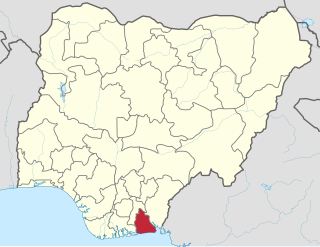
Akwa Ibom State is a state in the South-South geopolitical zone of Nigeria, bordered on the east by Cross River State, on the west by Rivers State and Abia State, and on the south by the Atlantic Ocean. The state takes its name from the Qua Iboe River which bisects the state before flowing into the Bight of Bonny. Akwa Ibom was split from Cross River State in 1987 with its capital Uyo and with 31 local government areas.
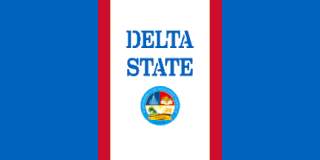
Delta State is a state in the South-east geopolitical zone of Nigeria. Named after the Niger Delta—a large part of which is in the state—the state was formed from the former Bendel State on August 27, 1991. Bordered on the north by Edo State, the east by Anambra and Rivers States, and the south by Bayelsa State while to the west is the Bight of Benin which covers about 160 kilometres of the state's coastline. The State was initially created with 12 local government areas in 1991 which was later extended to 19 and now has 25 local government areas. Asaba as its state capital is located along the River Niger on the northeastern end of the State, while the state's economic centre is the twin cities of Warri and Uvwie

Rivers State, also known as Rivers, is a state in the Niger Delta region of southern Nigeria. Formed in 1967, when it was split from the former Eastern Region, Rivers State borders include: Imo to the north, Abia and Akwa Ibom to the east, and Bayelsa and Delta to the west. The state capital, Port Harcourt, is a metropolis that is considered to be the commercial center of the Nigerian oil industry.
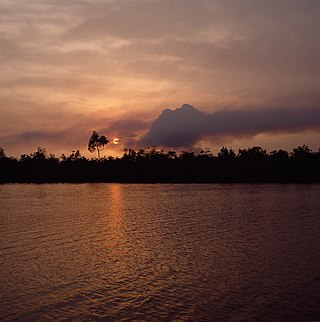
Bayelsa is one of the states in the South-South region of Nigeria, located in the core of the Niger Delta region. Bayelsa State was created in 1996 and was carved out from Rivers State, making it one of the newest states in the federation. Yenagoa is the capital city of Bayelsa State with most parts to have fallen within the high-risk of floods, suspects to occur annually. It shares a boundary with Rivers State to the East and Delta State to the west, with the waters of the Atlantic Ocean dominating its southern borders. It has a total area of 10, 773 km2. The state comprises eight Local Government Areas. they are Ekeremor, Kolokuma/Opokuma, Yenagoa, Nembe, Ogbia, Sagbama, Brass and Southern Ijaw. The state shares borders with Rivers State, of which it was formerly part, and Delta State.

Jigawa State (Hausa: Jihar Jigawa is one of the 36 states of Nigeria, located in the northern region of the country. Created in 1991 from the northeastern-most region of Kano State, Jigawa State is located on the border with Nigeria's national border with the Republic of the Niger. The state capital and largest city is Dutse. Jigawa state has 27 local governments

Kwara State, is a state in Western Nigeria, bordered to the east by Kogi State, to the north by Niger state, and to the south by Ekiti, Osun, and Oyo states, while its western border makes up part of the international border with Benin Republic. Its capital is the city of Ilorin and the state has 16 local government areas.
Environmental issues in the Niger Delta are caused by its petroleum industry. The delta covers 20,000 km2 (7,700 sq mi) within wetlands of 70,000 km2 (27,000 sq mi) formed primarily by sediment deposition. Home to 20 million people and 40 different ethnic groups, this floodplain makes up 7.5% of Nigeria's total land mass. It is the largest wetland and maintains the third-largest drainage basin in Africa. The Delta's environment can be broken down into four ecological zones: coastal barrier islands, mangrove swamp forests, freshwater swamps, and lowland rainforests. Fishing and farming are the main sources of livelihoods for majority of her residents.
The Niger Delta Development Commission is a federal government agency established by Nigerian president Olusegun Obasanjo in the year 2000 with the sole mandate of developing the oil-rich Niger Delta region of Nigeria. In September 2008, President Umaru Yar'Adua announced the formation of a Niger Delta Ministry, with the Niger Delta Development Commission to become a parastatal under the ministry. One of the core mandates of the commission is to train and educate the youths of the oil rich Niger Delta regions to curb hostilities and militancy, while developing key infrastructure to promote diversification and productivity.
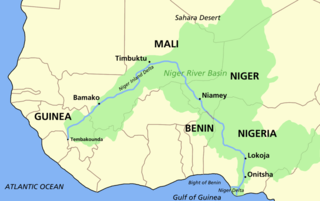
The Niger Basin Authority is an intergovernmental organization in West Africa aiming to foster co-operation in managing and developing the resources of the basin of the Niger River. The group is referred to by both the French and English initialisms, NBA or ABN.
Ogbaru is a local government area in Anambra State, south-central Nigeria. The area's local government headquarters is in the port city of Atani.
Victor Ndoma-Egba is a Nigerian politician and former Chairman of the Niger Delta Development Commission (NDDC). He was a three-term Senator, representing Cross River Central Senatorial District of Cross River State in the Nigerian Senate from 2003 to 2015.
Nigeria had one of the world's highest economic growth rates, averaging 7.4% according to the Nigeria economic report that was released in July 2019 by the World Bank. Following the oil price collapse in 2014–2016, combined with negative production shocks, the gross domestic product (GDP) growth rate dropped to 2.7% in 2015. In 2016 during its first recession in 25 years, the economy contracted by 1.6%. Nationally, 43 percent of Nigerians live below the poverty line, while another 25 percent are vulnerable. For a country with massive wealth and a huge population to support commerce, a well-developed economy, and plenty of natural resources such as oil, the level of poverty remains unacceptable. However, poverty may have been overestimated due to the lack of information on the extremely huge informal sector of the economy, estimated at around 60% more, of the current GDP figures. As of 2018, the population growth rate is higher than the economic growth rate, leading to a slow rise in poverty. According to a 2018 report by the World Bank, almost half the population is living below the international poverty line, and unemployment peaked at 23.1%. Nigeria had one of the world's highest economic growth rates, averaging 7.4% according to the Nigeria economic report that was released in July 2019 by the World Bank. Following the oil price collapse in 2014–2016, combined with negative production shocks, the GDP growth rate dropped to 2.7% in 2015. In 2016 during its first recession in 25 years, the economy contracted by 1.6%. Many individuals are faced with limited financial opportunities, extreme information poverty and unemployment, a lack of access to information technology resources, and other uniquely debilitating environmental circumstances as poverty.

In 2018, Nigeria's primary energy consumption was about 155 Mtoe. Most of the energy comes from traditional biomass and waste, which accounted for 73.5% of total primary consumption in 2018. The rest is from fossil fuels (26.4%) and hydropower.

Orashi River, is a river of the lower Niger River basin, and a tributary of Oguta Lake, southeastern Nigeria. Urashi takes off, 183 m above mean sea level, from the rocks in Ezeama community of Dikenafai, Imo State. Described as a lifeline to Ideato South communities, Orashi stream serves as an all purpose river for drinking, washing and many others to communities such as Umulewe, Umuchima and Ntueke in the area.
Heavy rains during the months of June, July and August 2016 resulted in extreme flooding of various rivers throughout Niger, particularly the Niger River, where the floods caused material damage and loss of life in Niger and other countries along the river's path.
Andrew Igbonule Uchendu is a Nigerian politician. He is currently a member of the Senate of Nigeria representing the Rivers East senatorial district. He had always been a member of the People's Democratic Party until 2014 when he switched allegiance to the All Progressives Congress party. Between 2003 and 2015, he represented the Ikwerre–Emohua constituency in the Federal House of Representatives.
River Basin Development Authorities in Nigeria are government agencies involved in the management of water resources for agriculture and other uses. Each authority operates in an assigned geo-morphological and political boundary and work to improve agriculture and rural development through irrigation, control of river pollution and also to assist farmers in processing food crops.
Groundwater in Nigeria is widely used for domestic, agricultural, and industrial supplies. The Joint Monitoring Programme for Water Supply and Sanitation estimate that in 2018 60% of the total population were dependent on groundwater point sources for their main drinking water source: 73% in rural areas and 45% in urban areas. The cities of Calabar and Port Harcourt are totally dependent on groundwater for their water supply.
References
- ↑ "Home". nigerdeltabasin.gov.ng. Retrieved 2022-05-27.
- ↑ "Senate queries Niger Delta Basin Development Authority over N220m contracts". Punch Newspapers. 2020-10-23. Retrieved 2022-05-27.
- ↑ NorthWindProject.com (2021-08-12). "RIVER BASIN DEVELOPMENT AUTHORITIES (RBDAS)". Bureau of Public Enterprises - BPE. Retrieved 2022-05-27.
- ↑ "NIGER DELTA BASIN DEVELOPMENT AUTHORITY-INVITATION TO TENDER AND EXPRESSION OF INTEREST FOR EXECUTION OF PROJECTS | Public Procurement NG". 2021-05-13. Retrieved 2022-05-27.
- ↑ "The Niger Delta – Niger Delta Budget Monitoring Group" . Retrieved 2022-05-27.
- ↑ "Development Institutions and the Niger Delta". 1library.net. Retrieved 2022-05-27.
- ↑ "Niger Delta Basin Authority gets new office complex". The Guardian Nigeria News - Nigeria and World News. 2019-02-18. Retrieved 2022-05-27.